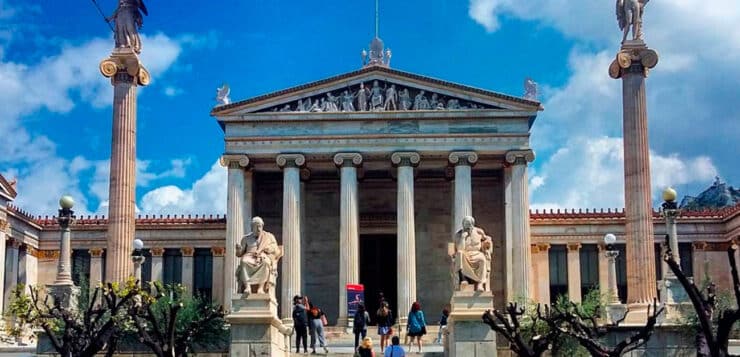In times of upheaval and uncertainty, a country’s survival relates strongly to the quality of its perception of change and its adaptability to new environments.
Sometimes change emerges as a necessity which forces us to redefine our goals, re-imagine our institutions and their operation, reshape the organisation of social mechanisms and re-invent. Our adaptability depends on our ability to extrapolate international tendencies and forthcoming technological and social trends.
The COVID-19 pandemic undermines traditional notions such as ‘social’ and ‘institutional’ with their diverse manifestations, underlining the necessity for their transformation. Education is no exception to this rule. The combined effect of the pandemic’s worldwide economic impact and school and university closures could result in a generational learning catastrophe.
According to the United Nations, the pandemic has brought the largest disruption of education systems in history, affecting nearly 1.6 billion learners in more than 190 countries and on all continents. Closures of schools and other learning spaces have impacted 94% of the world’s student population and up to 99% in low- and lower-middle income countries.
Nevertheless, it could be said that some countries have responded effectively to this unprecedented situation, seizing the opportunity to find new ways to address the learning crisis and bring about a set of solutions previously considered difficult or impossible to implement.
The Greek response
Greece has met the challenge of the COVID-19 pandemic efficiently. The country succeeded in adapting to new models of online and blended provision. Learning continuity was guaranteed, and teachers all over the country are able to conduct virtual real-time classes in conjunction with other online learning tools.
All necessary measures were taken, and networks are being upgraded constantly to enable teachers and students to attend online courses via live-streaming, with the aim of achieving 100% participation.
One could argue that the COVID-19 pandemic initiated the digital transformation of Greek education. This ‘emergency transition’ to remote learning possibly signals the beginning of a new era for Greek education.
Greek higher education institutions have demonstrated a deep commitment to creating the best possible learning environments for their students, being quick to replace face-to-face lectures with online learning.
Using technology, institutions were able to combine existing asynchronous teaching platforms with synchronous distance learning. Based on official data gathered by the Ministry of Education and Religious Affairs from tertiary education institutions nationwide, the University of Crete and Harokopio University offer 93% of their courses via distance learning.
Furthermore, in many higher education institutions, the move to distance learning has been an opportunity to expand flexible learning modalities, setting the stage for a sustained shift towards more online learning in the future.
Changes that would typically take many years because of differing managerial regulations were presented quickly within a limited number of days. This transformation has upgraded the digital competence of all parties involved, enhancing their collaborative and organisational knowledge within the high-tech framework of hyper-connectivity.
It is evident that, in the years to come, online learning will be sustained and education will become more hybrid.
A transition era
This response to the COVID-19 challenge coincides with Greece’s coordinated efforts to interconnect its universities with the global academic universe so as to make the country an international academic destination. From this perspective, digitalisation can be seen as a tool of internationalisation.
The wind of change which has blown through the country in the last two years has implications for higher education and has put internationalisation and modernisation at the centre of discussions about the country’s future.
Wanting to encourage higher education to look outwards, the Greek government created a new legal framework which focuses on internationalisation. Through this legislation, which came into effect at the end of 2019, the Greek Ministry of Education and Religious Affairs aims to remove any obstacles concerning the mobility of students, academics and administrative staff.
The new law enhances internationalisation in various ways. It states that higher education institutions have a mission to promote cooperation with other educational institutions and research bodies in the country and abroad so that they can take part in the European and international academic community.
The law also allows universities to offer English-taught undergraduate programmes for international students and provide joint programmes with international universities through very simple and quick procedures.
Another important aspect is the Study in Greece (SiG) initiative. This aims to improve the international image of Greek higher education institutions and creative interaction between Greek and foreign academic institutions. To this end, SiG has created an information portal which provides all information related to the Greek academic world.
Showcasing the wide variety of English-taught programmes offered by Greek universities, SiG also acts as a bridge between Greek and international academic communities by facilitating the creation of academic networks as well as by fostering synergies between Greek and foreign university departments in diverse disciplines.
Bringing classics and tech together
Despite the country’s economic difficulties, the government has understood the need to support higher education to prepare the country for the ‘shock’ of things to come in the wake of the Fourth Industrial Revolution and the need to prepare potential professionals to face challenges and provide solutions within a rapidly changing global environment.
The Greek Ministry of Education and Religious Affairs, along with the country’s public universities, are fostering the creation and development of new innovative initiatives which can bring together technological evolution, scientific research and the country’s tradition in the classical humanities.
For instance, the National and Kapodistrian University of Athens and the International Hellenic University are offering the first four-year BA programme taught in English devoted to the study of Greek antiquity. The programme gives foreign students the chance to delve into the world of classical wisdom, in its birthplace.
However, what Greek academia has to offer is not limited to the intellectual products of its glorious past. Greece is investing heavily in innovation with an emphasis on broad interdisciplinary learning. This modern tendency is reflected in the wide variety of cutting-edge masters degrees offered by Greek universities.
Eighteen universities in Greece offer around 140 masters programmes taught in a foreign language (mainly English) which provide foreign students with the opportunity to choose between a broad range of disciplines – from theoretical fields such as archaeology and classics to scientific fields such as medicine or biology and physics as well as technology-related subjects like IT, computer science and engineering, among others.
Greek higher education is constantly moving forward and developing and is a driving force for the country’s success and an important pillar of Greece’s soft power in a crucial period which demands urgent action.
Poised at the intersection of classical Logos and contemporary technology, reconciling the classical with the modern, the homeland of democracy, Western philosophy and science aims to provide a radical response to radically changing circumstances. In the era of machine learning and artificial intelligence, Aristotle not only survives, but inspires.
Contributed by:
Dr Theodoros Papaioannou is director of academic affairs at Study in Greece.







